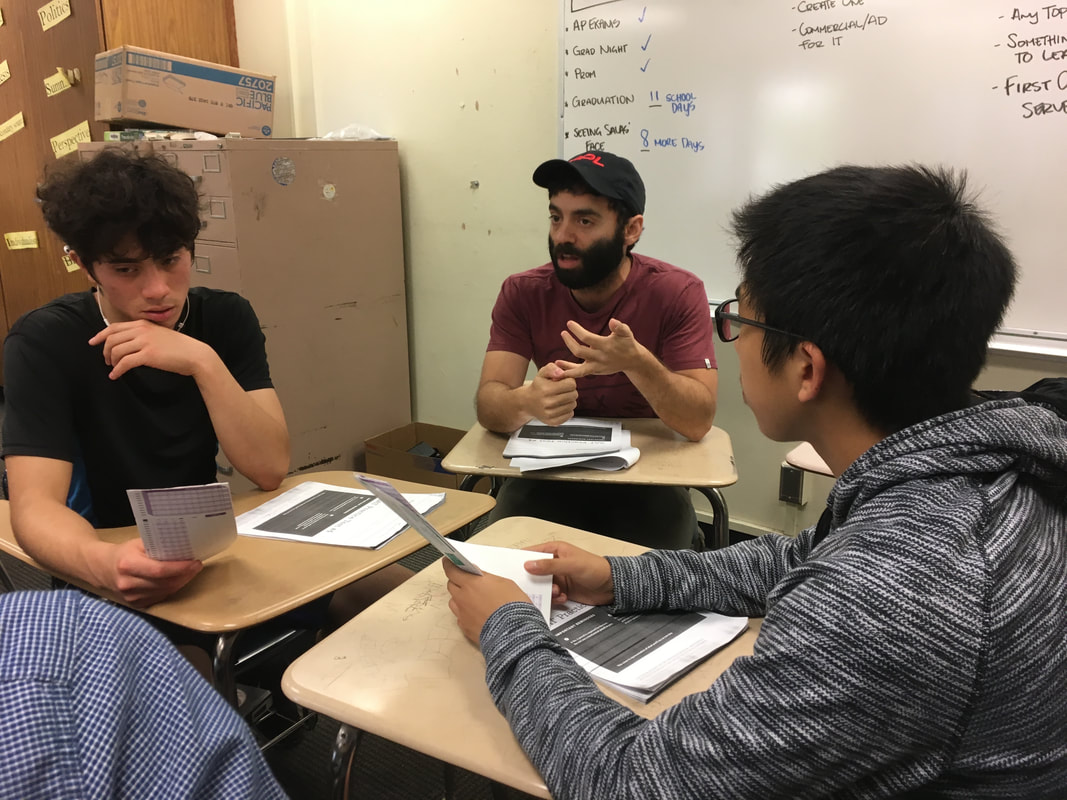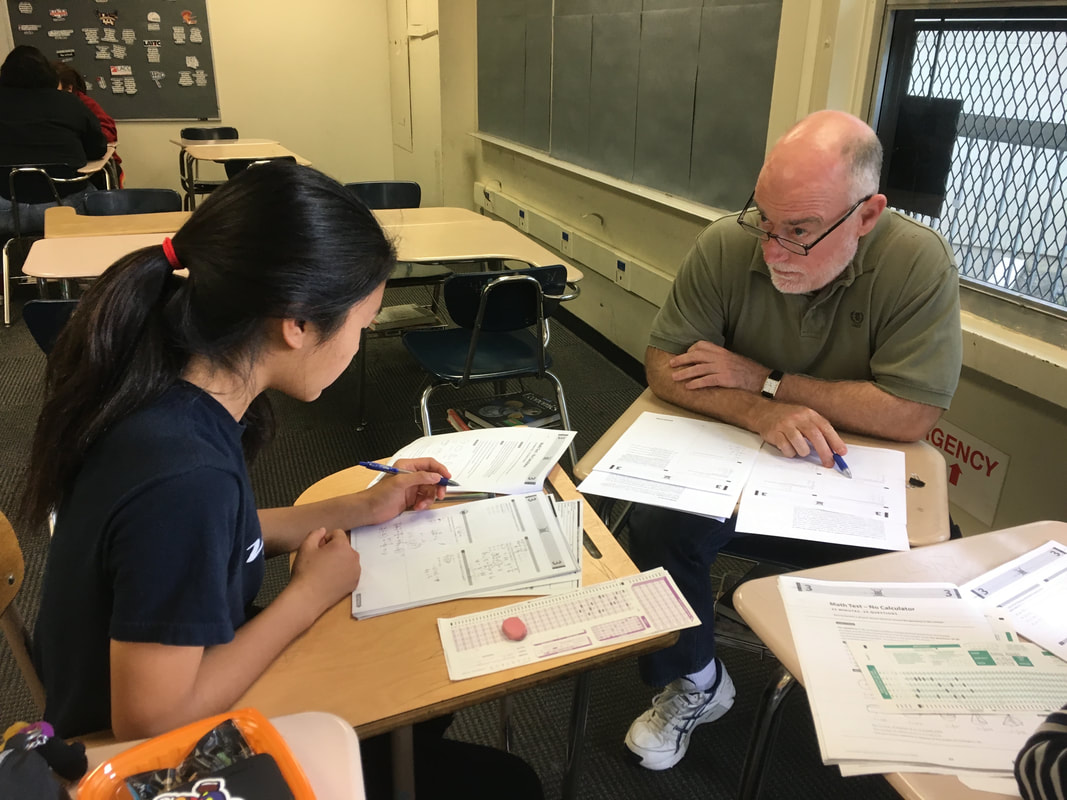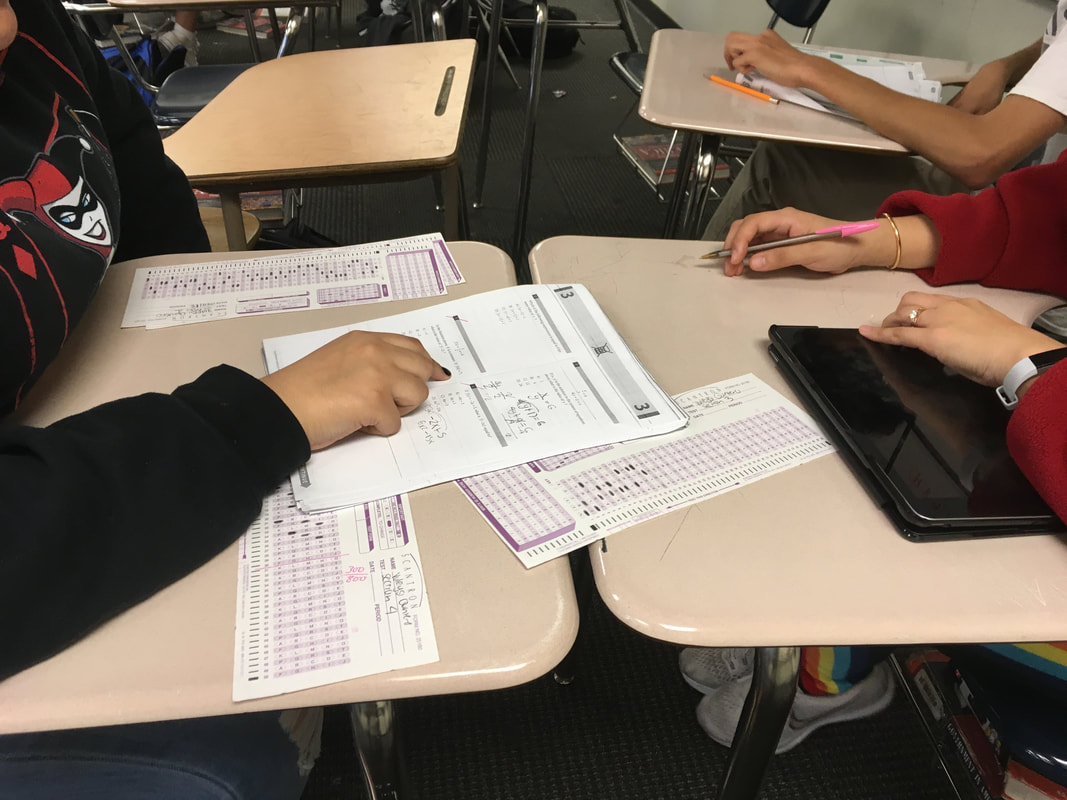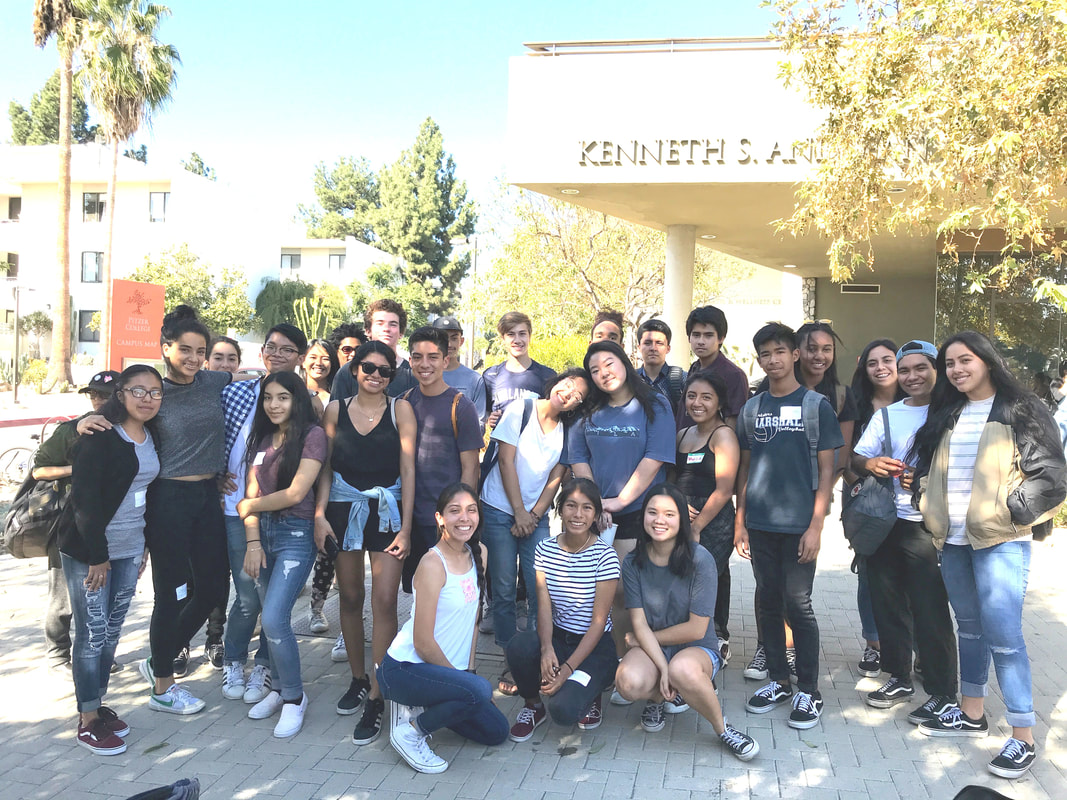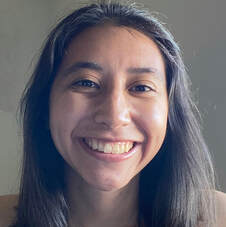
LUANA RODRIGUEZ
Marshall Class of 2020
I am a John Marshall High School alumna, Class of 2020, who is attending UCLA. I am currently a junior, but am planning to graduate a year early. Last summer, I had the fantastic opportunity to volunteer as a law clerk at Public Counsel, the nation’s largest provider of free legal services for clients who cannot afford to pay. I was one of 11 interns who worked in the Opportunity Under Law (OUL) program, which strives to use a model of community-based impact litigation to eliminate barriers to opportunity for disadvantaged people.
CollegePath LA executive director, Susan Philips, facilitated the internship. She put me in touch with Mark Rosenbaum, the OUL program’s directing attorney. I worked closely with him, as well as other supervisors, summer interns, lawyers, and paralegals. The internship was a hybrid model that allowed me to work remotely. Public Counsel is based in Los Angeles, but I spent most of the summer with my family in Lancaster, north of Los Angeles, and with my partner and his family in the Bay Area.
The internship affirmed my desire to become a public interest lawyer. Public Counsel attorneys, in one-on-one meetings, advised me how to make the most of law school, what to do after, and how to navigate the world to become a successful lawyer. They informed me about the different work cultures and job assignments in different law firms. I asked women lawyers if they had to work twice as hard to feel respected or taken seriously in their field. I, unfortunately, learned that they have faced and continue to face problems because of their gender identity.
Marshall Class of 2020
I am a John Marshall High School alumna, Class of 2020, who is attending UCLA. I am currently a junior, but am planning to graduate a year early. Last summer, I had the fantastic opportunity to volunteer as a law clerk at Public Counsel, the nation’s largest provider of free legal services for clients who cannot afford to pay. I was one of 11 interns who worked in the Opportunity Under Law (OUL) program, which strives to use a model of community-based impact litigation to eliminate barriers to opportunity for disadvantaged people.
CollegePath LA executive director, Susan Philips, facilitated the internship. She put me in touch with Mark Rosenbaum, the OUL program’s directing attorney. I worked closely with him, as well as other supervisors, summer interns, lawyers, and paralegals. The internship was a hybrid model that allowed me to work remotely. Public Counsel is based in Los Angeles, but I spent most of the summer with my family in Lancaster, north of Los Angeles, and with my partner and his family in the Bay Area.
The internship affirmed my desire to become a public interest lawyer. Public Counsel attorneys, in one-on-one meetings, advised me how to make the most of law school, what to do after, and how to navigate the world to become a successful lawyer. They informed me about the different work cultures and job assignments in different law firms. I asked women lawyers if they had to work twice as hard to feel respected or taken seriously in their field. I, unfortunately, learned that they have faced and continue to face problems because of their gender identity.
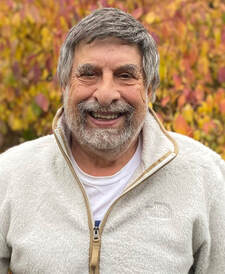 Mark Rosenbaum, director, Public Counsel Opportunity Under Law
Mark Rosenbaum, director, Public Counsel Opportunity Under Law
During my internship, I met with coworkers and supervisors on a regular schedule. Other meetings were set when I needed help with an assignment. I worked closely with my fellow law clerks to conduct research and learned how to collaborate on a legal team. I also had a chance to work independently. I edited and translated English documents into Spanish. I created and organized spreadsheets. I read hundreds of pages of information to understand the legal cases we pursued. I typically worked about 15 hours a week, via Zoom, Google Docs and Google Sheets.
One of the projects I worked on was a high-profile case seeking to reverse long standing educational and racial inequalities in the city of New York’s public schools. In March 2021, Public Counsel and a youth-led organization called Integrate NYC, filed a lawsuit against the state and city of New York, asserting students’ right to an antiracist education. Unfortunately, a judge dismissed the case as “not justiciable,” meaning that the matter is not the court’s job. One of my assignments, along with two colleagues, was to help prove the case’s justiciability.
The internship taught me the importance of mental health management and a strong support system. I learned that to prove to prospective employers my dedication to public interest law, I should spend summers doing public interest work. I learned the difference between a resume and a CV and how to write each one. I also learned that there is no “right” path to becoming a lawyer; what is important is that you forge your own path based on what works for you.
Public Counsel staff members were very kind and friendly. I was expecting staff attorneys with a no nonsense attitude, but they were also welcoming and made time to meet with us. I’ve heard that lawyers are miserable and hate their jobs, so I was pleasantly surprised to find Public Counsel attorneys who are passionate about what they do. No one came across as cutthroat. It gave me peace of mind to know that I wouldn’t be losing who I am if I pursue a legal career.
Most importantly, I have gained a support network to help me navigate through the legal system. This experience helped solidify my decision to pursue a law degree and a career in the public interest. The internship opened my eyes to many disheartening conditions in our society, but those insights further empower me to become a lawyer and help fight for social justice.
One of the projects I worked on was a high-profile case seeking to reverse long standing educational and racial inequalities in the city of New York’s public schools. In March 2021, Public Counsel and a youth-led organization called Integrate NYC, filed a lawsuit against the state and city of New York, asserting students’ right to an antiracist education. Unfortunately, a judge dismissed the case as “not justiciable,” meaning that the matter is not the court’s job. One of my assignments, along with two colleagues, was to help prove the case’s justiciability.
The internship taught me the importance of mental health management and a strong support system. I learned that to prove to prospective employers my dedication to public interest law, I should spend summers doing public interest work. I learned the difference between a resume and a CV and how to write each one. I also learned that there is no “right” path to becoming a lawyer; what is important is that you forge your own path based on what works for you.
Public Counsel staff members were very kind and friendly. I was expecting staff attorneys with a no nonsense attitude, but they were also welcoming and made time to meet with us. I’ve heard that lawyers are miserable and hate their jobs, so I was pleasantly surprised to find Public Counsel attorneys who are passionate about what they do. No one came across as cutthroat. It gave me peace of mind to know that I wouldn’t be losing who I am if I pursue a legal career.
Most importantly, I have gained a support network to help me navigate through the legal system. This experience helped solidify my decision to pursue a law degree and a career in the public interest. The internship opened my eyes to many disheartening conditions in our society, but those insights further empower me to become a lawyer and help fight for social justice.
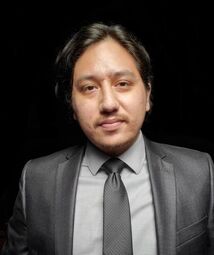
WILFREDO MERCADO
Marshall Class of 2012
Wilfredo Mercado recently completed a Juris Doctorate at Southwestern Law School in Los Angeles. Due to the COVID-19 pandemic, the graduation ceremony was held online. Now he is studying for the California Bar Exam. During law school, he worked with local offices of the National Labor Relations Board and the Equal Employment Opportunity Commission.
Wilfredo graduated from John Marshall High School in 2012 and went on to California State University, Northridge. He graduated in 2016 with a Bachelor of Arts in Sociology, Work & Society, and a minor in Political Science.
Why did you decide to go to law school?
My parents immigrated to this country and worked hard to provide me with the opportunity to obtain an education. With the support of my family, I had the privilege of being able to focus on my studies. I am fluent in the Spanish language and I want to use this ability to help end the exploitation of immigrants, workers, and people of color. Due to language barriers and the costs of litigation, these groups are underserved. I want to bridge the gap and help people assert their rights.
What do you want to do with your law degree?
I want to advocate for workers and defend their rights. I hope to practice in the fields of labor and employment law. Labor law addresses issues involving unions, group action, and collective bargaining. I want to help workers exercise their rights to unionize and to improve their wages, terms, and conditions of employment. Knowledge of employment law will equip me to help workers assert their rights to a work environment free of harassment and discrimination. I also hope to eventually expand my practice into immigration law.
How did CollegePath LA help you?
When I was a student at John Marshall High School I learned about the organization’s program to help students with the college application process. I attended several workshops where I learned how to navigate the College Board website and to sign up for the SAT and ACT exams. I attended free SAT preparation classes offered by the program. CollegePath LA matched me with mentors and organized field trips to local universities. I also received guidance on completing applications to campuses of the California State University system, and to the Free Application for Federal Financial Aid (FAFSA).
Marshall Class of 2012
Wilfredo Mercado recently completed a Juris Doctorate at Southwestern Law School in Los Angeles. Due to the COVID-19 pandemic, the graduation ceremony was held online. Now he is studying for the California Bar Exam. During law school, he worked with local offices of the National Labor Relations Board and the Equal Employment Opportunity Commission.
Wilfredo graduated from John Marshall High School in 2012 and went on to California State University, Northridge. He graduated in 2016 with a Bachelor of Arts in Sociology, Work & Society, and a minor in Political Science.
Why did you decide to go to law school?
My parents immigrated to this country and worked hard to provide me with the opportunity to obtain an education. With the support of my family, I had the privilege of being able to focus on my studies. I am fluent in the Spanish language and I want to use this ability to help end the exploitation of immigrants, workers, and people of color. Due to language barriers and the costs of litigation, these groups are underserved. I want to bridge the gap and help people assert their rights.
What do you want to do with your law degree?
I want to advocate for workers and defend their rights. I hope to practice in the fields of labor and employment law. Labor law addresses issues involving unions, group action, and collective bargaining. I want to help workers exercise their rights to unionize and to improve their wages, terms, and conditions of employment. Knowledge of employment law will equip me to help workers assert their rights to a work environment free of harassment and discrimination. I also hope to eventually expand my practice into immigration law.
How did CollegePath LA help you?
When I was a student at John Marshall High School I learned about the organization’s program to help students with the college application process. I attended several workshops where I learned how to navigate the College Board website and to sign up for the SAT and ACT exams. I attended free SAT preparation classes offered by the program. CollegePath LA matched me with mentors and organized field trips to local universities. I also received guidance on completing applications to campuses of the California State University system, and to the Free Application for Federal Financial Aid (FAFSA).
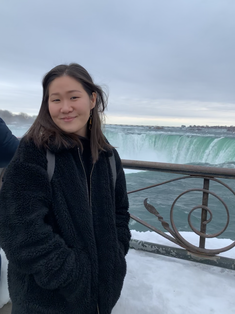
SKYE CHOE
Marshall Class of 2016
Skye Choe recently graduated from Syracuse University in upstate New York. She has launched a career as a behavioral therapist, helping children with learning disabilities. In 2015-2016, Skye co-chaired CollegePath LA’s campus club at John Marshall High School. We caught up with her during the COVID-19 shutdown as she was preparing to start her new job.
Tell us about your job. Why did you decide to work with autistic children and their families?
My main goal is to help children who are struggling with socializing with their peers as well as with learning in the classroom. I decided to do this work because I've always been passionate about children, specifically young children. I’m keenly interested in the effects that mental disorders have on every aspect of an individual's life, including everyday tasks. It was a no-brainer for me to enter a career path that involved challenged kids. I’m determined to help them strive to be their best and to overcome their disability.
What was your major? Why did you choose it? How did your degree help you find your career path?
I majored in psychology and minored in sociology. I initially pursued psychology because I was interested in how the brain works. I wasn't sure what being a psychology major entailed, or how it would fit into a career. I dabbled in other fields such as political science and policy studies, but none hooked my interest more than psychology. Sociology was the only other subject that I found captivating, so I decided to minor in it. A light bulb turned on in my head when I saw how the science of psychology connected with social issues I care about. That’s when I decided to look for jobs within that spectrum.
How were you involved with CollegePath LA? What did we offer that helped you?
I was co-chair from fall of 2015 to the spring of 2016. I took advantage of the personal statement and career workshops. The personal statement workshops helped hone my writing skills and provided writing tips that I took with me to college. The career workshops informed me about careers I would have otherwise never thought about. The presenters also encouraged me to consider opportunities within a broad search spectrum and to avoid limiting myself to a specific job type. I received many helpful tips from CollegePath LA alumni, especially about adjusting to college and how to get the most out of my time there!
Marshall Class of 2016
Skye Choe recently graduated from Syracuse University in upstate New York. She has launched a career as a behavioral therapist, helping children with learning disabilities. In 2015-2016, Skye co-chaired CollegePath LA’s campus club at John Marshall High School. We caught up with her during the COVID-19 shutdown as she was preparing to start her new job.
Tell us about your job. Why did you decide to work with autistic children and their families?
My main goal is to help children who are struggling with socializing with their peers as well as with learning in the classroom. I decided to do this work because I've always been passionate about children, specifically young children. I’m keenly interested in the effects that mental disorders have on every aspect of an individual's life, including everyday tasks. It was a no-brainer for me to enter a career path that involved challenged kids. I’m determined to help them strive to be their best and to overcome their disability.
What was your major? Why did you choose it? How did your degree help you find your career path?
I majored in psychology and minored in sociology. I initially pursued psychology because I was interested in how the brain works. I wasn't sure what being a psychology major entailed, or how it would fit into a career. I dabbled in other fields such as political science and policy studies, but none hooked my interest more than psychology. Sociology was the only other subject that I found captivating, so I decided to minor in it. A light bulb turned on in my head when I saw how the science of psychology connected with social issues I care about. That’s when I decided to look for jobs within that spectrum.
How were you involved with CollegePath LA? What did we offer that helped you?
I was co-chair from fall of 2015 to the spring of 2016. I took advantage of the personal statement and career workshops. The personal statement workshops helped hone my writing skills and provided writing tips that I took with me to college. The career workshops informed me about careers I would have otherwise never thought about. The presenters also encouraged me to consider opportunities within a broad search spectrum and to avoid limiting myself to a specific job type. I received many helpful tips from CollegePath LA alumni, especially about adjusting to college and how to get the most out of my time there!
SAT PREPARATION WORKSHOPS, SPRING 2019
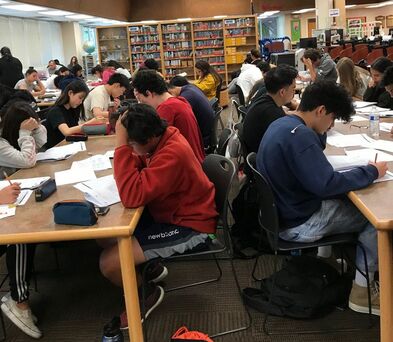
March was SAT prep month at John Marshall High School. CollegePathLA’s mission was to introduce students to nonprofit education company Khan Academy’s online study tools. On four consecutive Saturday mornings, CollegePath LA volunteers oversaw and proctored SAT practice tests under conditions that simulated a real test day.
Nick Cherneff and Flynn Berry, professional writers who have worked as tutors for SAT prep companies, spearheaded the initiative. They tell students that the most important thing they can do to prepare is to take multiple practice tests.
In total, about 150 students participated in the program. On Tuesday and Thursday afternoons an average of 50 students gathered with volunteers in the library for language and math tutoring, using Khan Academy resources. On Saturdays, about 30 students arrived at 8 am to take a practice test.
School administrators and teachers promoted the program to students. In written surveys afterwards, 100% of the participants said they would recommend the program to their peers. They said they wished the program could be expanded to offer more study sessions and practice tests over a longer period of time. Here’s what students said…
…About tips and strategies
I’ve learned to go back and dissect the important info from a text and to focus on the main idea.
I learned grammar rules and problem solving approaches.
It is best to follow your intuition and not doubt yourself.
Slow down! Don’t space out while you are taking the test.
…About the volunteers
I love the dedication you guys have. You guys are amazing.
I really liked how I got so much feedback and help; and how kind everyone was. This really helped improve my test taking skills.
I liked that there are people to answer questions to and I like the environment of the program.
…About the program
I liked the ability to retake the test multiple times.
I wish there were more practice SAT tests; longer duration than one month.
It gave us an opportunity to practice and improve our English and math skills.
I liked the instant score after Kahn Academy practice tests. I didn’t mind doing it on paper since it’s similar to the actual SAT. The tutors were wonderful and helpful.
It gave me a time and place to practice. It kept me organized.
Nick Cherneff and Flynn Berry, professional writers who have worked as tutors for SAT prep companies, spearheaded the initiative. They tell students that the most important thing they can do to prepare is to take multiple practice tests.
In total, about 150 students participated in the program. On Tuesday and Thursday afternoons an average of 50 students gathered with volunteers in the library for language and math tutoring, using Khan Academy resources. On Saturdays, about 30 students arrived at 8 am to take a practice test.
School administrators and teachers promoted the program to students. In written surveys afterwards, 100% of the participants said they would recommend the program to their peers. They said they wished the program could be expanded to offer more study sessions and practice tests over a longer period of time. Here’s what students said…
…About tips and strategies
I’ve learned to go back and dissect the important info from a text and to focus on the main idea.
I learned grammar rules and problem solving approaches.
It is best to follow your intuition and not doubt yourself.
Slow down! Don’t space out while you are taking the test.
…About the volunteers
I love the dedication you guys have. You guys are amazing.
I really liked how I got so much feedback and help; and how kind everyone was. This really helped improve my test taking skills.
I liked that there are people to answer questions to and I like the environment of the program.
…About the program
I liked the ability to retake the test multiple times.
I wish there were more practice SAT tests; longer duration than one month.
It gave us an opportunity to practice and improve our English and math skills.
I liked the instant score after Kahn Academy practice tests. I didn’t mind doing it on paper since it’s similar to the actual SAT. The tutors were wonderful and helpful.
It gave me a time and place to practice. It kept me organized.
SAT preparation workshops, spring 2018
college campus tours
Increasing students’ exposure to a variety of college campuses has long been a goal of John Marshall High School’s college counselor, Tricia Bryan. “Many students have applied to colleges close by and never visited them,” she says.
To facilitate campus tours, CollegePath LA has raised funds to sponsor monthly bus trips to colleges in southern California. Since October, Mrs. Bryan has escorted groups of 25 to 40 students to Cal Poly Pomona, Pitzer College, Cal State Dominguez Hills and UC Irvine.
The trips have made a difference. They confirmed some students’ interest in applying. One student decided to apply to Pitzer after attending an “open house” for prospective students, Mrs. Bryan says. UC Irvine became the “first choice” school of one student visitor.
Logistics, including traffic, are challenging. The first outing to Cal Poly Pomona was rushed because the trip took longer than expected. Most tours have been on Friday mornings, but some have been longer, and included lunch. At Pitzer, the open house included free food, a dorm room tour, and talks on admissions and financial aid. At UC Irvine, CollegePath LA paid for lunch in a dorm cafeteria.
Mingling with students over a meal offers an authentic taste of college life. At UC Irvine, a highlight was encountering students in the cafeteria who were Marshall graduates. After lunch, when it was time to board the bus back to Marshall, Mrs. Bryan says she momentarily forgot that the alumni weren’t leaving with them!
At Cal State Dominguez Hills, students were awarded T-shirts and pens for correctly answering questions after the tour. Older parts of the college lack greenery and open space, but new construction is transforming the campus. Students were especially impressed with “Manifest Destiny,” a magnificent mural that celebrates a multiethnic view of American history.
More field visits are on the drawing board, including a large group outing to the college fair in Pasadena on April 26. CollegePath LA aims to eventually help prospective students visit colleges in other parts of California, and out of state. “My mission since I started this job was to expand the number of colleges that students apply to and attend,” Mrs. Bryan says.
To facilitate campus tours, CollegePath LA has raised funds to sponsor monthly bus trips to colleges in southern California. Since October, Mrs. Bryan has escorted groups of 25 to 40 students to Cal Poly Pomona, Pitzer College, Cal State Dominguez Hills and UC Irvine.
The trips have made a difference. They confirmed some students’ interest in applying. One student decided to apply to Pitzer after attending an “open house” for prospective students, Mrs. Bryan says. UC Irvine became the “first choice” school of one student visitor.
Logistics, including traffic, are challenging. The first outing to Cal Poly Pomona was rushed because the trip took longer than expected. Most tours have been on Friday mornings, but some have been longer, and included lunch. At Pitzer, the open house included free food, a dorm room tour, and talks on admissions and financial aid. At UC Irvine, CollegePath LA paid for lunch in a dorm cafeteria.
Mingling with students over a meal offers an authentic taste of college life. At UC Irvine, a highlight was encountering students in the cafeteria who were Marshall graduates. After lunch, when it was time to board the bus back to Marshall, Mrs. Bryan says she momentarily forgot that the alumni weren’t leaving with them!
At Cal State Dominguez Hills, students were awarded T-shirts and pens for correctly answering questions after the tour. Older parts of the college lack greenery and open space, but new construction is transforming the campus. Students were especially impressed with “Manifest Destiny,” a magnificent mural that celebrates a multiethnic view of American history.
More field visits are on the drawing board, including a large group outing to the college fair in Pasadena on April 26. CollegePath LA aims to eventually help prospective students visit colleges in other parts of California, and out of state. “My mission since I started this job was to expand the number of colleges that students apply to and attend,” Mrs. Bryan says.
Collegepath la inspires a Marshall High alumna
Sheryl Mixey, a John Marshall High School alumna, lives in a remote rural community in eastern Washington. On Palm Sunday every year, her ladies’ club hosts a ham dinner to raise money for high school scholarships.
“We usually raise about $1,000,” she says. Last year, however, no high school senior applied for the money. This was distressing because scholarships are sorely needed. Nearly three-quarters of the 150 students at the local K-12 school are low income and qualify for free breakfast and lunch.
Sheryl set out to learn more about college admissions and scholarships. Her research brought her to the website of CollegePath LA, which helps students navigate the college application process at her alma mater. Sheryl quickly realized that her club needed a more proactive approach.
“I can definitely understand how a low-income family can think it is impossible to send a child to college. We need to instill hope in the minds of the students and their families,” she says. She contacted CollegePath LA and talked for more than an hour with Susan Philips. Her “enthusiasm rubbed off on me,” Sheryl says.
Sheryl, in turn, spread that enthusiasm to a senior at the local high school. “He was a little discouraged because he is practically homeless, staying here and there with friends and classmates, she says. Despite a high SAT score and a 4.0 GPA, the student hadn’t received much guidance towards college or financial aid.
Sheryl stepped up. She encouraged him to apply to a university and told him about the FAFSA (Free Application for Federal Student Aid). Now he has been accepted to Washington State University (WSU) and has $4,000 in aid to start. “He is very excited about applying for other scholarships and has a different outlook about everything now,” she says.
“It makes me feel good to know that I had a small part to play in getting him on the right road to his dream career all as a direct result of making contact with CollegePath LA. The Enterprise Ladies’ Club now has direction and insight as to how to help those at our local school because of what is happening at my old alma mater, John Marshall High School.”
“We usually raise about $1,000,” she says. Last year, however, no high school senior applied for the money. This was distressing because scholarships are sorely needed. Nearly three-quarters of the 150 students at the local K-12 school are low income and qualify for free breakfast and lunch.
Sheryl set out to learn more about college admissions and scholarships. Her research brought her to the website of CollegePath LA, which helps students navigate the college application process at her alma mater. Sheryl quickly realized that her club needed a more proactive approach.
“I can definitely understand how a low-income family can think it is impossible to send a child to college. We need to instill hope in the minds of the students and their families,” she says. She contacted CollegePath LA and talked for more than an hour with Susan Philips. Her “enthusiasm rubbed off on me,” Sheryl says.
Sheryl, in turn, spread that enthusiasm to a senior at the local high school. “He was a little discouraged because he is practically homeless, staying here and there with friends and classmates, she says. Despite a high SAT score and a 4.0 GPA, the student hadn’t received much guidance towards college or financial aid.
Sheryl stepped up. She encouraged him to apply to a university and told him about the FAFSA (Free Application for Federal Student Aid). Now he has been accepted to Washington State University (WSU) and has $4,000 in aid to start. “He is very excited about applying for other scholarships and has a different outlook about everything now,” she says.
“It makes me feel good to know that I had a small part to play in getting him on the right road to his dream career all as a direct result of making contact with CollegePath LA. The Enterprise Ladies’ Club now has direction and insight as to how to help those at our local school because of what is happening at my old alma mater, John Marshall High School.”
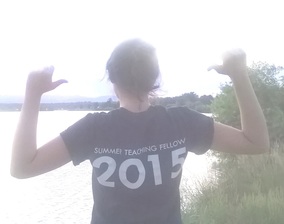
KAREN OLIVA
Marshall Class of 2013
This summer I was a teaching fellow for Generation Teach Summer Academy, a seven-week education program in Denver, Colorado. After two weeks of training, I taught 6th grade reading three times a day and was an advisor to three students.
Generation Teach challenged me to work hard. I discovered that teachers’ responsibilities don’t end when the students go home; there are lessons to be planned and student responses to be read. I was tired a lot but never had I felt so happy and tired at the same time.
Teaching boosted my self-confidence. Initially, I questioned whether I could be the leader my students needed, but with practice I developed my teacher presence and learned how to lead a class. Experienced teachers observed each fellow’s class at least twice a week, followed by a coaching conference. Seeing my students learn as a result of my teaching helped me believe in myself.
I heard about the fellowship from a friend who was accepted into Generation Teach at its other site in Boston. I applied because I’m interested in a career in education and I wanted to know if I would like teaching. In Denver, there were 60 fellows divided between two public middle schools. Most fellows were college students or recent graduates. The fellowship is also open to high school students after their sophomore year.
Marshall Class of 2013
This summer I was a teaching fellow for Generation Teach Summer Academy, a seven-week education program in Denver, Colorado. After two weeks of training, I taught 6th grade reading three times a day and was an advisor to three students.
Generation Teach challenged me to work hard. I discovered that teachers’ responsibilities don’t end when the students go home; there are lessons to be planned and student responses to be read. I was tired a lot but never had I felt so happy and tired at the same time.
Teaching boosted my self-confidence. Initially, I questioned whether I could be the leader my students needed, but with practice I developed my teacher presence and learned how to lead a class. Experienced teachers observed each fellow’s class at least twice a week, followed by a coaching conference. Seeing my students learn as a result of my teaching helped me believe in myself.
I heard about the fellowship from a friend who was accepted into Generation Teach at its other site in Boston. I applied because I’m interested in a career in education and I wanted to know if I would like teaching. In Denver, there were 60 fellows divided between two public middle schools. Most fellows were college students or recent graduates. The fellowship is also open to high school students after their sophomore year.
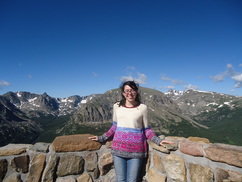
The program included a $2,100 stipend and free housing located at an apartment about 20 minutes from downtown Denver. I used my stipend to pay for my plane ticket, groceries and other expenses.
There were plenty of memorable moments this summer. One of them occurred one afternoon when a student came into class upset after his previous class. He said he had a hard time grasping the material and felt like he was not as smart as the other students. In his hand, he held a note he had written, full of self-deprecating remarks. The other students noticed that he wasn’t his usual self and asked him what was wrong. When they saw the note, they immediately responded. They told him he is an intelligent, funny person and that they enjoy being in class with him.
It was a special moment where the class came together to comfort him and let him know that they valued him. It was then that I realized we had become a community.
There were plenty of memorable moments this summer. One of them occurred one afternoon when a student came into class upset after his previous class. He said he had a hard time grasping the material and felt like he was not as smart as the other students. In his hand, he held a note he had written, full of self-deprecating remarks. The other students noticed that he wasn’t his usual self and asked him what was wrong. When they saw the note, they immediately responded. They told him he is an intelligent, funny person and that they enjoy being in class with him.
It was a special moment where the class came together to comfort him and let him know that they valued him. It was then that I realized we had become a community.
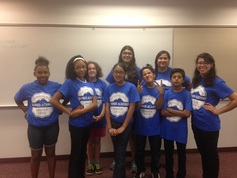
I enjoyed getting to know my students. They were funny, insightful and though some misbehaved in my class, they were all sweet and eager to read. I think that the people around you can make or break an experience. The bonds I formed with my students and colleagues at Generation Teach are what made this summer unforgettable.
By Karen Oliva
Occidental College (expected graduation 2017)
By Karen Oliva
Occidental College (expected graduation 2017)

